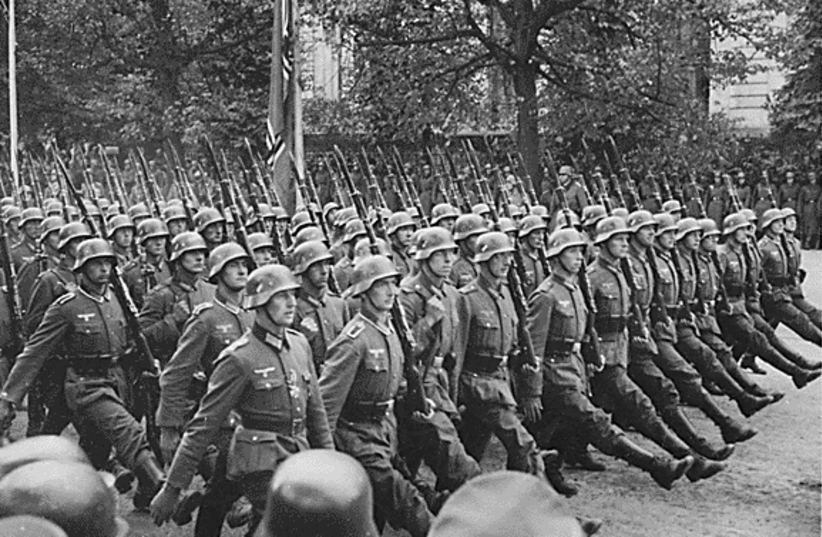International Holocaust Remembrance Day (IHRD) on January 27th is the day when all Jews and non-Jews should ponder the Shoah’s meaning for all peoples as an expression of the Nazi racist worldview, whereas on Yom Hashoah in April, Jews rightly lament our own horrendous losses.
Many commentators continue to complain that the United Nations (UN) decision to establish IHRD was motivated by a desire to pretend that the UN is not against Jews, but only against Israel or its actions. However true such complaint, a special meaning about the Shoah should be given for the nations. This can be best demonstrated by a What-If scenario so that many more non-Jews would understand and come to say, “But for our lucky stars, there also would we have gone.”
This is no idle armchair exercise to rethink history, but the application of social philosophy best guided by thought leaders, not historians. Such contemplation has a good chance to lay a more solid foundation for human alliance with other peoples, all non-Jewish, some of whom otherwise may eventually become tired of hearing year in and year out about how terrible it was for the Jews, especially as the last surviving witnesses depart. As the English editor in 2005 of all texts for Yad Vashem’s Holocaust History Museum, I can venture to say that this perspective is not sufficiently treated at Yad Vashem as a whole, for all its good focus on the Shoah’s uniqueness.
Too many loose-thinking people easily forget that, unlike other genocides, the industrial extermination of Jews was part of a Nazi master plan for world racist domination. Much more evil would still have come to others had Nazi Germany achieved total victory! A telling way to illustrate this is to look at a most probable case analysis of Nazi German imperialism had it won World War II.
Discussion of the German onslaught during World War II rarely touches on what would have happened elsewhere in the world had the Third Reich been victorious. What would have been the logical worldwide consequences of a triumphant German Nazi racist regime?
In dealing with such aftermath, some authors have dealt with the implications in Europe and America – a fascist-leaning Britain and Ukraine, an enslaved Poland, and German alliance with a virulently segregationist United States.
Only a few have dealt at any length with the fate of blacks in Africa, as well as blacks around the world, under the boot of a 1,000-Year German Reich and its racist allies. The successful application of Nazi ideology during World War II would have sought new frontiers. Most important is that the ideology of Aryan superiority would appear to have been vindicated in the minds of hundreds of millions of whites around the world and something to be declared from every podium, taught in every school, and advanced under imported and home-grown Nazi guidance in other regions - for the noble goal of improving the human race.
But Africa and blacks? During WW II there were very few blacks living under German occupation in Europe and of so were of little concern or interest, that is, until a prospective German victory. Then, Nazi attention to blacks would probably have been an important element in their racial purification of humanity.
With such German victory, Africa would soon have come into Nazi scopes, because of an historic grievance. One of the first acts dealing with Nazi repartitioning of the world would be Hitler’s convening of a Berlin conference to deal with the return of all of Germany’s colonies that had been stolen by Britain, France and Belgium in the aftermath of World War I.
The following is only a list of these colonies for Africa, which any stamp collector will recognize: Tanganyika (Tanzania today), Ruanda-Urundi (Rwanda & Burundi), Wituland (in Kenya), Southwest Africa (Namibia and part of Botswana), Kamerun (Cameroon and part of Nigeria), and Togoland (Togo and part of Ghana).
More could logically be added as part of the defeated Allies’ reparations to Berlin. Expansion of Vichy France’s enslaved colonies in Africa could also result.
Fascist Italy’s colonies would be consolidated around subjugated Ethiopia. Belgium’s cruel Aryan rule in the Congo (DRC) would reach a new low under racist ideology that would place man above God. Soon thereafter, expanded Nazi collaboration would follow with apartheid Dutch South Africa and the newly-fascist British colonies of Northern Rhodesia (Zambia), Southern Rhodesia (Zimbabwe) and Nyasaland (Malawi).
Once German colonial administration would have been restored and consolidated, black Africans would be reduced to mostly slave labor and to tribe-by-tribe genocide in cases of revolt - even to genocide?! Yes! The first German genocide on a large scale took place in 1904-07, not in Europe, but in today’s Namibia, then an Imperial German colony. The Herero and the Nama peoples had taken up arms and in the subsequent massacre, 10,000 Nama (half their population) and approximately 65,000 Hereros (about 80% of their population) were systematically murdered. The survivors suffered dispossession, deportation, forced labor and racial segregation. Many refer to this genocide as a precursor in the German psyche to Nazism and the Shoah.
This is but a small perspective on the implications of Nazi world racist theory and practice. A permanent exposition about such darkening of the nations could shed additional light on the meaning of the Shoah for other peoples – Slavs, Africans, Americans and many more. It is also capable of leading more German youth to affirm that godless Nazi Germany’s defeat was good, without the offering of any excuses. As one who worked with Yad Vashem for a number of years, I can affirm that it is capable of rising to such challenges outside the confines of its history museum – with history as an assist, not as its benchmark.
The author is a retired US foreign service officer, Jerusalem resident and served eight years in Black Africa among several other postings abroad. Today, he is a board member of the Israel-Africa Friendship Association, as well as the Israel Interfaith Association. As well, he is the founding president of the Jewish Covenant Alliance, R.A., championing Jewish service to the nations in the spiritual struggle against regime evil in the world.

